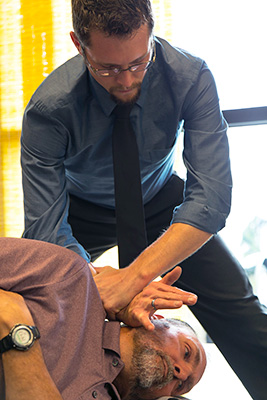
If you’re living with fibromyalgia, you already know—it’s not just about pain. It’s the kind of exhaustion that sleep doesn’t fix. It’s waking up sore for no reason. It’s feeling like your body and brain are working against you. And it’s the invisible toll—the frustration of trying to explain your symptoms to people who don’t understand, and the heartbreak of trying treatments that never seem to work.
If you’re here, searching for fibromyalgia relief in Vancouver WA, it likely means you’ve already tried a few things. Maybe medications dulled the symptoms but came with side effects. Maybe stretching helped for a day. Maybe nothing changed at all.
And yet… you're still holding onto hope that there has to be something better. That your body isn’t broken. That healing is still possible.
This blog is for you.
We’ll walk through five of the most promising options people are turning to for fibromyalgia relief in Vancouver WA—including one approach that helps many finally feel seen, understood, and on a path toward lasting change.
If you’ve been wondering why nothing has truly worked yet—or what to try next—keep reading. You're not alone in this, and there are still options worth exploring.
One of the most frustrating things about fibromyalgia is how misunderstood it still is—even in medical circles. People are often told:
Meanwhile, they’re waking up every day in pain.
Fibromyalgia is believed to be a neurological condition affecting how your brain and nervous system process pain signals. That’s why treatments that focus solely on the muscles, joints, or inflammation often don’t lead to lasting relief.
In other words, if you’ve tried things like muscle relaxers or physical therapy and didn’t improve—you’re not crazy, and you’re not alone. You may just need to shift the focus to your nervous system.
Let’s take a closer look at your options.
What it is: Doctors may prescribe antidepressants, anti-seizure meds, or pain relievers to help manage symptoms.
Why it can help: These medications can help “turn down the volume” on nerve pain signals and reduce sleep disturbances in some cases.
What to watch for: Medications don’t address the root cause. Additionally, you should consult with your GP about how the prescribed medication might interact with other medications or supplements you currently take and how it can potentially affect your day-to-day life. In most cases, patients come to us looking for non-pharmaceutical options after years of cycling through prescriptions.
What it is: This includes dietary changes (like anti-inflammatory eating), regular low-impact movement, gentle stretching, and stress management strategies like breathwork or yoga.
Why it can help: Your nervous system is highly responsive to your environment. Clean eating, hydration, better sleep, and movement all reduce internal stress on your system.
What to consider: These changes are helpful but often take time to make an impact. And if the nervous system is already overstimulated or misfiring (due to atlas subluxation), lifestyle tweaks may not be enough on their own.
What it is: Hands-on care that addresses soft tissue tension, postural imbalances, or muscular tightness.
Why it can help: It can help improve blood flow, reduce muscle spasms, and calm the nervous system when done gently.
What to consider: If your pain is rooted in neurological dysfunction, this approach may help symptoms—but not eliminate the problem.
What it is: This approach looks at the full-body picture—digestion, hormones, inflammation, sleep, and more—through advanced testing and whole-body wellness strategies.
Why it can help: Many people with fibromyalgia also have gut issues, adrenal dysfunction, or nutrient deficiencies. Functional medicine can identify and treat those missing links.
What to consider: This can offer a whole-body approach to healing the body and may help balance your system. However, it might not directly address structural or neurological misalignment.
What it is: A highly specialized form of chiropractic care that focuses on the top two bones in your neck—the atlas (C1) and axis (C2)—which protect the brainstem and help regulate your entire nervous system.
Why it can help: Many people with fibromyalgia have a history of head or neck trauma (even minor ones, like car accidents, sports injuries, or falls). These events can shift the atlas out of alignment—something called an atlas subluxation—and quietly disrupt the way your brain and body communicate.
This misalignment may be at the root of:
At Balanced Living Chiropractic in Vancouver, WA, Dr. Joseph Perin and Dr. Vanessa Wulff specialize in gentle, precision-based corrections to the upper cervical spine. They use precise adjustments based on imaging scans and detailed analysis of one’s posture. Doing so can help your nervous system recalibrate and your body heal naturally.
Here’s what many fibromyalgia patients have in common: their bodies are capable of healing, but something’s interfering with the process. Our job is to remove that interference.
If your system is constantly in fight-or-flight mode, no amount of rest, supplements, or stretching will bring true relief—because your brain and body are stuck in survival mode.
Upper cervical care in Vancouver WA can help bring calm back to the chaos.
If you’re tired of bouncing between doctors, exhausted from trying things that don’t work, and ready to actually feel better—not just manage your condition—our team at Balanced Living Chiropractic is here to help.
We look forward to helping you unlock fibromyalgia relief in Vancouver WA. Let’s help you start the next chapter—one with less pain, more clarity, and more peace in your body. Book your consultation with one of our Vancouver WA chiropractic doctors today!

What are the most recommended options for fibromyalgia relief in Vancouver WA?
Common options include medication, physical therapy, lifestyle changes, integrative medicine, and upper cervical chiropractic care. Many patients find lasting results by combining approaches and focusing on nervous system regulation.
How do I choose the right relief option for my fibromyalgia?
Ask yourself what you’ve already tried, and whether those approaches address the root cause or just the symptoms. If you've had previous head or neck injuries, upper cervical care in Vancouver WA may be worth exploring.
Can lifestyle changes really make a difference in my fibromyalgia?
Yes—but they work best when your nervous system is balanced. Movement, diet, and sleep habits all support healing, but structural misalignments need to be addressed first for those changes to take hold.
How can I support my body’s natural healing process when dealing with fibromyalgia?
Remove interference. Gentle adjustments from a Vancouver WA chiropractor like Dr. Perin and Dr. Wulff can reduce nerve irritation and help your body shift out of chronic stress mode, so it can begin to heal from within.
To schedule a consultation with Dr. Joe Perin, call our Vancouver office at 360-569-1740. You can also click the button below.
If you are outside of the local area, you can find an Upper Cervical Doctor near you at www.uppercervicalawareness.com.



